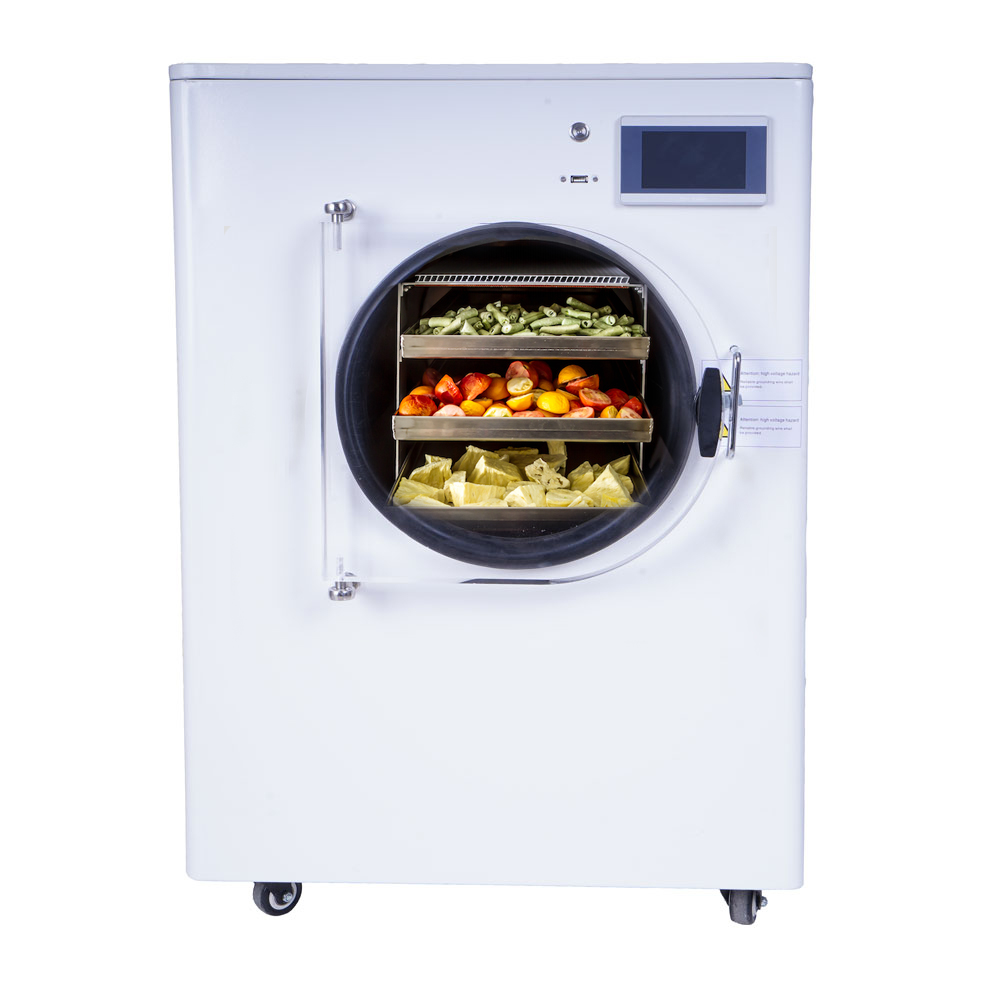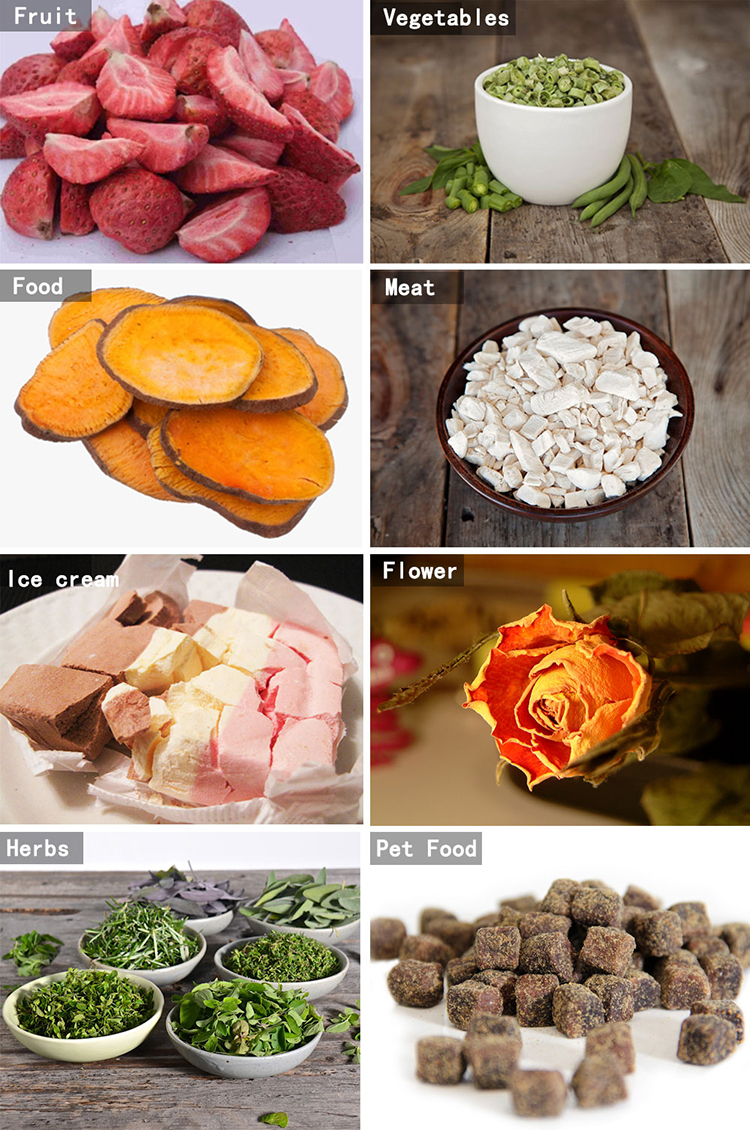Home Food Freeze Dryer

What is freeze dryer?
Freeze-dryer, also referred to as lyophilization, is a process that involves freezing a substance at very low temperatures and then extracting liquid via sublimation, converting water from a solid to gaseous state. A major advantage of this process is that the water extracted this way passes straight from solid to gas without going through the liquid phase.
Freeze-dryer is very good at increasing the shelf-life and storage length of a product while retaining its three-dimensional shape and integrity. It is a commonly used preservation technique in the food industry, which is suitable for many different types of food. It produces a high-quality product.
The Freeze Dryer Process:
Lyophilization is performed in three main stages using specialist equipment. The process involves:
Freezing – This is carried out rapidly to avoid the formation of large ice crystals, which can damage the structure of the product.
Vacuum – The product is subjected to a deep vacuum, well below the triple point of water. This is the point where solid, liquid, and gaseous forms of the material can coexist.
Drying – Water is drawn out of the material through sublimation, which causes the solid ice to transition to gaseous vapor without passing through the liquid phase again. Low pressure (to a few millibars) aids in this part of the process. Thus, the structural integrity and chemical profile of the product can be preserved to a high degree.
Food that is to undergo freeze-drying is typically pre-treated in some manner. Common methods include the concentration of the product, increasing the surface area, addition of components such as preservatives, and IQF (Individual Quick Freezing) of smaller pieces of food (this makes the food product free-flowing and better suited for the process.) Pre-treatment is usually carried out because of the demands of cycle time and considerations of product quality.
Freeze Dryer vs Dehydrator: What Sets Them Apart
Preservation Method
Dehydrators remove moisture from food by creating a hot and dry environment which reduces water content dramatically while preserving the texture, nutritional value, and flavor of the dried food as much as possible.Unlike regular ovens, food dehydrators can create the perfect temperatures to get the food bone-dry while not actually cooking it.The end result is either hard and brittle or has a gummy-like texture (that’s because the water content is not completely removed – some dehydrated fruit and veggies may still have as much as 30% water content left).
Freeze dryers are relatively newcomers on the food preservation scene. Freeze drying is a state-of-the-art food preservation.Fortunately, now you no longer need bulky high-tech devices to freeze dry your food at home, as freeze dryers are now a lot more compact and commercially available for home use as well.Freeze dryers will preserve food by abruptly drop the temperature in a vacuum chamber to below zero and then by gradually raising it.The water in food will rapidly freeze then slowly evaporate, which helps better preserve the texture, flavor, and nutrients in food.
Water Content
A commercial dehydrator will remove from 90% to 95% of the water content in food while a freeze dryer is designed to strip moisture from food by 98-99%.It is worth noting that most fruit and veggies are made of 80% to 95% water, while most types of meat contain from 50% to 75% water.
Nutritional Value
When it comes to the nutritional value of preserved food, freeze dryers shine bright. It is estimated that a freeze dryer can preserve around 97% of the initial value of a food, which means that freeze-dried food can be just as nutritious as fresh food.
By contrast, food dehydrators manage to preserve only 50% to 60% of the original nutritional value, mainly because the drying process is not as abrupt as in a freeze dryer, which means that minerals and vitamins have plenty of time to degrade.
By dehydrating food, you’ll lose plenty of vitamin A, C, and the vitamins in the B group (niacin, riboflavin, thiamine, etc.) Freeze-dried food might lack vitamin C, so you should remember to stockpile some.
Average Shelf Life
Beside nutritional value, the shelf life of dried foods is just as important for a prepper. The shelf life largely depends on the amount of moisture removed from the food during the dehydration or freeze-drying processes.
It is estimated that a freeze dryer offers a longer shelf life to foods than a dehydrator. For instance, fruits and vegetables will have an average shelf life of 15 years with a dehydrator and an average shelf life of 25 years with a freeze dryer.
The shelf life of food dried in a DIY dehydrator, however, will have an average shelf life of just 1 year.
Texture and Taste
This is where freeze dryers have made it hands down to the top again. Freeze dried food tastes, looks, and even smells better than dehydrated food because freeze-drying doesn’t require very much heat.
In other words, the nutrients and flavor are preserved withing the food itself, rather than evaporate during the process. The original texture is preserved as well.In fact, freeze dried foods are so tasty that you can eat them as snacks without re-hydrating them first, which makes them the ideal option for long hikes and bugging-out scenarios.Also, freeze-dried foods are more lightweight than their dehydrated counterparts, which makes them the perfect choice for ultra-light backpacking and family camping trips. So, if you’re searching for a freeze dryer for sale and want to know more about your options, we’ve got you covered.

The Future of Food Freeze Dryer:
As the tastes and economic considerations of consumers evolve, there is more need for high-quality nutritious food products that can be readily available in stores for purchase. As the world becomes more connected, the storage and transportation of food is becoming more of a consideration for governments and businesses.
Lyophilization is a tested and proven technology that meets the criteria and needs of an ever-evolving society. From strawberries to chicken, coffee, and tea, to ingredients for pastries and ready meals, lyophilization as a method of preservation likely has a long future ahead of it.
Previous: What is an autoclave
- High-tech Zone, Zhengzhou City, Henan Province, China.
- +86 132 9817 7608
- info@rotovap-wellknown.com
- li249869402
Copyright © Zhengzhou Well-known Instrument & Equipment Co.,Ltd. All Rights Reserved Sitemap










